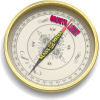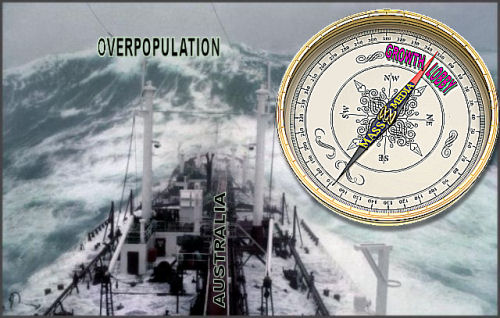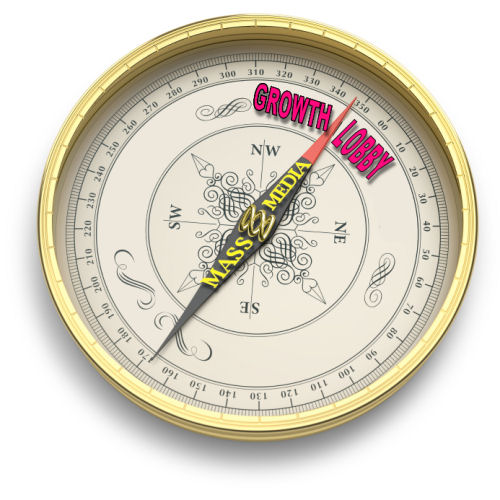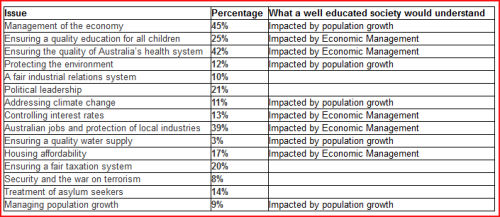
 The ABC has done a great job documenting its Vote Compass Project. However the results highlight the role of the ABC in setting the election issue agenda, despite the fact that the ABC explains: "Vote Compass is not a poll. It is primarily and fundamentally an educational tool intended to promote electoral literacy and stimulate public engagement in the policy aspect of election campaigns."
The ABC has done a great job documenting its Vote Compass Project. However the results highlight the role of the ABC in setting the election issue agenda, despite the fact that the ABC explains: "Vote Compass is not a poll. It is primarily and fundamentally an educational tool intended to promote electoral literacy and stimulate public engagement in the policy aspect of election campaigns."
 Some time ago I complained to MediaWatch that the ABC Vote Compass was biased due to its omission of the Population Growth Management issue. I am still waiting on their response. The results of the Vote Compass appear to support this complaint.
Some time ago I complained to MediaWatch that the ABC Vote Compass was biased due to its omission of the Population Growth Management issue. I am still waiting on their response. The results of the Vote Compass appear to support this complaint.
The Essential Report, 23 July 2013 was a poll that identified population growth management as a Top 15 Federal Election issue without including immigration as an issue. Immigration is one input to population growth management. The outcome is arguably the issue. Just as water shortage is an outcome/issue and water consumption is one input to this issue. Numerous other polls in recent years, including ANU Polling, have also identified population growth as a significant concern for 50% or more of respondents. The ABC's Vote Compass listed immigration as an issue but omitted Population Growth Management (which is a pure sustainability issue that should be untainted by racism or xenophobia). Was this pro population growth bias?
Agenda-setting theory applied to the ABC's 'Vote Compass'
Agenda-setting theory describes the "ability [of the news media] to influence the salience of topics on the public agenda." That is, if a news item is covered frequently and prominently the audience will regard the issue as more important. Agenda-setting theory was formally developed by Dr. Max McCombs and Dr. Donald Shaw in a study on the 1968 US presidential election. They demonstrated a strong correlation (r > .9) between what people thought was the most important election issue and what the local and national news media reported was the most important issue. By comparing the salience of issues in news content with the public's perceptions of the most important election issue, McCombs and Shaw were able to determine the degree to which the media determines public opinion. Since the 1968 study, more than 400 studies have been published on the agenda-setting function of the mass media, and the theory continues to be regarded as relevant. (ref. Wikipedia).

Neutral and/or Undecided
The Vote Compass Results show that of the 30 listed issues, the largest neutral (or undecided) votes went to:
- How many new immigrants should Australia admit? (35.9%)
- How much financial support should the Commonwealth provide to the car industry? (36.0%)
- How accessible should abortion services be in Australia? (39.4%)
- How much government regulation should there be on business? (41.1%)
- How much should the government spend on defence? (46.3%)
Were these high Neutral votes because of the complexity of the issues, a feeling of being unqualified to decide due to lack of information/understanding, or simply no opinion? The latter seems highly unlikely for the population growth management issue (which is a pure sustainability issue), and the issue itself is relatively simple to understand. Is the relationship between population growth, population size and migration being confused by government and media under-reporting the adverse impacts of rapid population growth while rapid migration continues? Does defining the issue under the banner of migration confuse and lead to any opposition being characterised as racist or xenophobic? How perfect this might be for those favouring rapid growth!
The smallest neutral or undecided votes went to:
- Medicare should offer basic dental care for everyone, even if people have to pay a higher Medicare levy. (7.4%)
- Boats carrying asylum seekers be turned back. (8.7%)
- Students in government and non-government schools should receive the same amount of federal funding. (9.0%)
- The government should further restrict foreign ownership of Australian agricultural land.(9.1%)
- Should asylum seekers who arrive by boat should not be allowed to settle in Australia (9.3%)
Was this because voters are confident that they understand these issues and/or feel they have enough information to form an opinion?
Balanced (and therefore Contentious/Controversial?)
The issues showing the most balanced agreement/disagreement (or more/less) rating (ie with the proportion of those agreeing within roughly +/-5% of the proportion disagreeing) are listed below with percentages (Neutral/Agree/Disagree):
- How may new immigrants should Australia admit? (35.9%/30.2%/33.8%) (Not covered by the ABC in lead up to the election. This is also a completely different issue to Population Growth Management which was not even listed as an issue)
- Boats carrying asylum seekers should be turned back (8.7%/43.5%/43.8%) (Covered by the ABC in lead up to the election)
- The national budget deficit should be reduced, even if it means fewer public services (12.6%/45.6%/41.8%) (Covered by the ABC in lead up to the election)
- When there is an economic problem government spending usually makes it worse (18.5%/40.1%/41.4%) (Related to the above)
- Live animal exports should be banned (15.9%/39.1%/45%) (Major issue covered by the ABC)
- Australia should end the monarchy and become a republic (21.5%/40.4%/38.1%) (Subject of a Referendum in 1999)
As shown by the percentages, the immigration issue is in a class of its own; with balanced agreement/disagreement combined with a very high neutral vote.
Some conclusions
Conclusions that could be drawn from these Vote Compass results include:
- The immigration issue has one of the highest neutral and/or undecided votes, which could reflect a failure of the ABC in promoting electoral literacy of this issue, relative to other issues
- The ABC did not cover the contentious immigration issue in the lead up to the election, which could reflect a failure of the ABC in promoting electoral literacy of this issue, relative to other contentious issues
- The ABC did not include the Population Growth Management issue at all, which reflects a failure of the ABC in promoting electoral literacy of this contentious issue, relative to other contentious issues
- Failure to cover the Population Growth Management issue, despite the results of the Vote Compass categorising the related issue of immigration as both contentious and somewhat misunderstood, indicates a degree of pro population growth bias by the ABC which is totally consistent with the ABC track record in this key area of National importance. [For more on this see Candobetter articles at: ABC bias]
Findings of the Essential Report, 23 July 2013: Which are the three most important issues in deciding how you would vote at a Federal election?

Punch Line
The Vote Compass confirms that all the major political parties (Labor, Liberal, Green) support ongoing rapid, migration-based population growth at or above current (2012) levels. In 2012 the level was 1.8% per annum (roughly 4 times the OECD country average based on CIA World Factbook Data versus ABS data for 2012).
The Vote Compass preferentially concealed the existence (under the term "other") of a party standing to represent voters concerned about population growth management (The Stable Population Party), while preferentially naming parties such as Wikileaks, Katter, Palmer. Wasn't this all simply part of the ABC's biased agenda setting?
Do results of the Vote Compass showing balanced agreement/disagreement combined with a large proportion of neutral or undecided votes, conclusively show the impact of ABC bias by omission of information in this key population policy area? Has the ABC selectively chosen to ignore an issue when it should fully understand that 50% or more of voters disagree with Liberal, Labor and Green policy? Does it really matter why this happened? Isn't it simply important to recognise the bias and make amends by correcting it? You can encourage the ABC by signing, and most importantly also forwarding, this petition. Thank you for supporting this cause:
Australia requires a public inquiry to determine a basis for the optimum rate of population growth
What, exactly, is the ABC's definition of bias in its Code of Practice? Here's what they say in their introduction: "The ABC has a statutory duty to ensure that the gathering and presentation of news and information is impartial according to the recognised standards of objective journalism....... Aiming to equip audiences to make up their own minds is consistent with the public service character of the ABC. A democratic society depends on diverse sources of reliable information and contending opinions."........ and so it continues ..........
Key findings from the ANU poll (October 2010 http://socpol.anu.edu.au/polls-and-surveys/anupoll/population and http://socpol.anu.edu.au/polls-and-surveys/anupoll/polls/governance and http://socpol.anu.edu.au/polls-and-surveys/anupoll/polls/environment) include:
- 44 per cent of Australians favour population growth, while 52 per cent want the population to remain at or below current levels.
- Opposition to population increase is broadly-based, with concerns about the effect on the economy and the environment.
- A majority of Australians think the world’s population is too large and is causing environmental damage.
- Half of the country say people should consider limiting the sizes of their families in order to minimise the impact of population growth.
- 16 per cent of Australians would want to see population increase through more immigration rather than through increased fertility.
- Two thirds of Australians say the ageing population will cause real problems — a majority are concerned about the government’s ability to tackle the problem and reject increased taxes as a solution.

Add comment